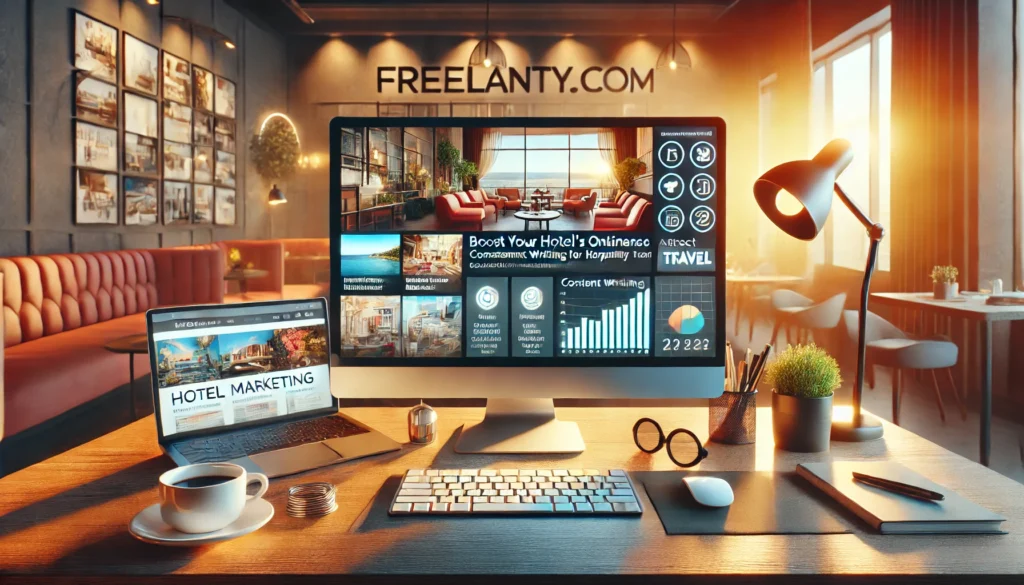







In the dynamic world of hospitality and travel, content writing is more than just a marketing tool—it’s a key driver of online visibility, client engagement, and bookings. For hotels and travel agencies, crafting engaging, SEO-optimized content is essential to stand out in a crowded market. This article explores the importance of content writing in the hospitality and travel industries, offering strategies to boost your hotel’s online presence and attract more clients through content marketing.
In the competitive hospitality and travel industries, brand visibility is crucial. Content writing helps your business appear in search engine results, social media feeds, and online travel platforms. By consistently publishing high-quality, SEO-optimized content, you can increase your online presence, attract more visitors to your website, and ultimately, drive more bookings.
Engagement is key to converting visitors into guests or clients. Content writing allows you to connect with your audience by addressing their needs, desires, and concerns. Whether it’s through informative blog posts, captivating destination guides, or enticing hotel descriptions, content that resonates with your audience can inspire them to choose your services over competitors.
Content writing is an effective way to drive direct bookings and client inquiries, reducing your reliance on third-party platforms. By providing valuable information and compelling calls to action, you can guide potential guests and travelers through the decision-making process, leading them to book directly through your website or contact your agency for more details.
Your hotel’s description is often the first impression potential guests have of your property. It should be descriptive, highlighting the unique features, amenities, and experiences your hotel offers. Use vivid language to paint a picture of what guests can expect, and incorporate keywords to improve search engine rankings. Don’t forget to include a call to action, encouraging readers to book now or learn more.
Blog posts and articles are powerful tools for engaging potential guests and driving traffic to your website. Write about topics that interest your target audience, such as local attractions, travel tips, or upcoming events in your area. Use your blog to position your hotel as not just a place to stay, but as a gateway to memorable experiences. Regularly updated blogs also help improve your SEO, keeping your website fresh and relevant.
Visual content and storytelling are essential in the hospitality industry, where experiences and aesthetics play a significant role. High-quality images, videos, and virtual tours can bring your hotel to life, allowing potential guests to visualize themselves enjoying their stay. Complement visuals with storytelling that evokes emotion and creates a connection with your audience, making them more likely to choose your hotel.
User-generated content (UGC), such as guest reviews and photos, is highly influential in the decision-making process. Encourage satisfied guests to share their experiences on social media or review platforms, and feature this content on your website. Positive reviews and authentic guest photos add credibility to your brand and help build trust with potential guests.
For travel agencies, understanding your target audience is the first step in creating effective content. Are your clients adventure seekers, luxury travelers, or family vacationers? Tailor your content to address the specific interests, concerns, and preferences of your audience. This ensures that your content resonates with the right people and encourages them to book their next trip through your agency.
A well-thought-out content marketing strategy is essential for attracting and retaining clients. Start by defining your goals, whether it’s increasing brand awareness, driving more inquiries, or boosting repeat business. Then, plan your content around these goals, focusing on topics that align with your audience’s interests and your agency’s expertise. A mix of blog posts, social media updates, email newsletters, and video content can help you reach a wider audience.
SEO optimization is critical for ensuring that your travel content reaches potential clients. Conduct keyword research to identify the terms your target audience is searching for, such as “luxury vacation packages,” “family-friendly destinations,” or “adventure travel deals.” Incorporate these keywords naturally into your content, and optimize meta tags, images, and URLs to improve your search engine rankings.
Content marketing isn’t just about providing information; it’s also about promoting your services. Highlight special offers, exclusive travel deals, and unique experiences that set your agency apart from the competition. Use engaging language and visuals to create a sense of urgency and excitement, encouraging clients to take advantage of these opportunities before they’re gone.
A content calendar is a valuable tool for planning and organizing your content efforts. It ensures that you consistently publish new content and allows you to plan around key dates, such as peak travel seasons, holidays, or special events. Your content calendar should include a mix of blog posts, social media updates, promotional content, and visual content, all aligned with your business goals and audience interests.
In the hospitality and travel industries, your content should be welcoming and inviting. Write in a conversational tone that makes your audience feel at ease and excited about their upcoming travel plans. Use language that speaks directly to your readers, creating a personal connection that encourages them to choose your services.
What makes your hotel or travel agency stand out from the competition? Whether it’s your location, amenities, personalized service, or exclusive travel packages, be sure to highlight your unique selling points (USPs) in your content. Emphasizing what sets you apart can help attract clients who are looking for something special and different.
Cultural sensitivity and inclusivity are crucial in the global hospitality and travel industries. Be mindful of the diverse backgrounds, beliefs, and customs of your audience when creating content. Use inclusive language, avoid stereotypes, and consider the cultural context of your messaging. This approach not only shows respect for your audience but also broadens your appeal to a wider range of potential clients.
Keyword research is the foundation of SEO. Identify the keywords and phrases that potential guests and travelers are searching for related to your services. Use tools like Google Keyword Planner, SEMrush, and Ahrefs to find high-volume, low-competition keywords. For example, keywords like “best beachfront hotels,” “family-friendly resorts,” or “luxury travel packages” can help attract the right audience to your website.
On-page SEO involves optimizing the content on your website to improve its search engine rankings. Key practices include:
Backlinks, or links from other websites to your content, are an important factor in SEO. They signal to search engines that your content is credible and authoritative. To build a strong backlink profile, focus on creating high-quality content that others in the travel and hospitality community will want to link to. You can achieve this by:
Local SEO is particularly important for hospitality and travel businesses that serve specific regions or cities. To optimize for local search:
The hospitality and travel industries are highly competitive, with many businesses vying for the same audience. To stand out, your content must be unique, engaging, and value-driven. Focus on highlighting what sets your business apart and offering content that resonates deeply with your target audience’s desires and expectations.
The travel and hospitality industries are dynamic, with trends and consumer preferences constantly evolving. To keep your content fresh and relevant:
While it’s important to promote your services, overly promotional content can turn off potential clients. Balance promotional content with value-driven content that offers helpful information, tips, or inspiration without pushing a hard sell. For example, instead of just promoting a hotel package, write about the unique experiences guests can enjoy while staying at your hotel, subtly incorporating the promotion within a broader narrative.
For businesses targeting international travelers, creating content in multiple languages can be challenging. To manage multilingual content:
Outsourcing content writing can offer significant benefits for hospitality and travel businesses, including:
Professional content writers who specialize in travel and hospitality bring valuable industry knowledge and experience. They understand the nuances of the industry, such as the importance of vivid descriptions, the role of storytelling in engaging travelers, and the best practices for promoting destinations and services. Their expertise ensures that your content is both engaging and effective.
Outsourcing content writing can be more cost-effective than hiring full-time staff, especially for small to medium-sized businesses. It also saves time by allowing you to focus on other important aspects of your business, such as customer service and operations, while professionals handle your content needs.
When selecting a content writing partner, consider the following:
Why is content writing important for hospitality and travel businesses?
Content writing is crucial because it enhances your online visibility, engages potential guests and travelers, and drives bookings and inquiries. High-quality content can differentiate your business from competitors and establish your brand as a trusted leader in the industry.
How can SEO-optimized content help my hotel or travel agency grow?
SEO-optimized content improves your website’s search engine rankings, making it easier for potential clients to find you online. By targeting relevant keywords and providing valuable information, SEO-driven content can attract more traffic, generate leads, and ultimately increase bookings and client inquiries.
What types of content should hospitality and travel businesses focus on?
Focus on a mix of content types, including hotel and destination descriptions, blog posts, travel guides, user-generated content, and visual content like images and videos. Each type serves a different purpose, from engaging potential clients to showcasing your services and driving conversions.
How often should I update my travel or hospitality content?
Consistency is key. Aim to update your blog or website with fresh content at least once a week, or more frequently if possible. Regular updates help keep your audience engaged and improve your site’s SEO performance.
What are the benefits of outsourcing content writing for hospitality and travel businesses?
Outsourcing allows you to access professional writing expertise, save time, and ensure that your content is high-quality and SEO-optimized. It can be more cost-effective than managing content creation in-house, and it allows you to focus on other critical areas of your business.
How do I choose the right content writing service for my hospitality or travel business?
Choose a service with experience in the travel and hospitality industries, a strong portfolio, and positive client testimonials. Ensure they understand your brand’s voice and can deliver content that aligns with your business goals and SEO strategies.
Content writing is a powerful tool for hospitality and travel businesses looking to enhance their online presence, engage potential clients, and drive bookings. By focusing on creating high-quality, SEO-optimized content, hotels and travel agencies can stand out in a competitive market, attract more clients, and build lasting relationships with travelers. Whether you manage content creation in-house or outsource to professionals, the key is to remain consistent, client-focused, and strategic in your approach. With the right content strategy, your hospitality or travel business can achieve long-term success and growth in a dynamic industry.
Ready to take your project to the next level? At Freelanty, we connect you with talented freelancers who bring your vision to life. Contact us today and discover how we can help you succeed.